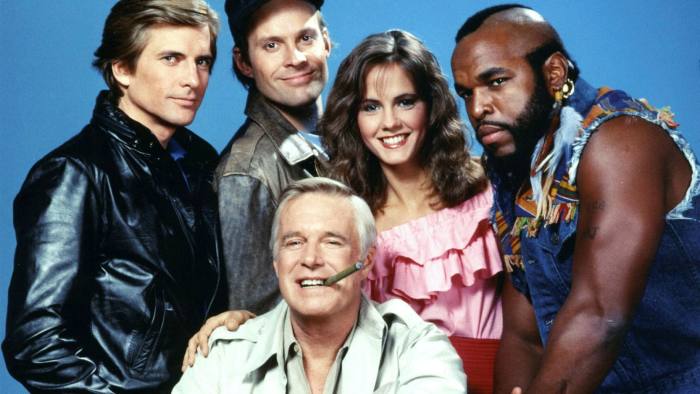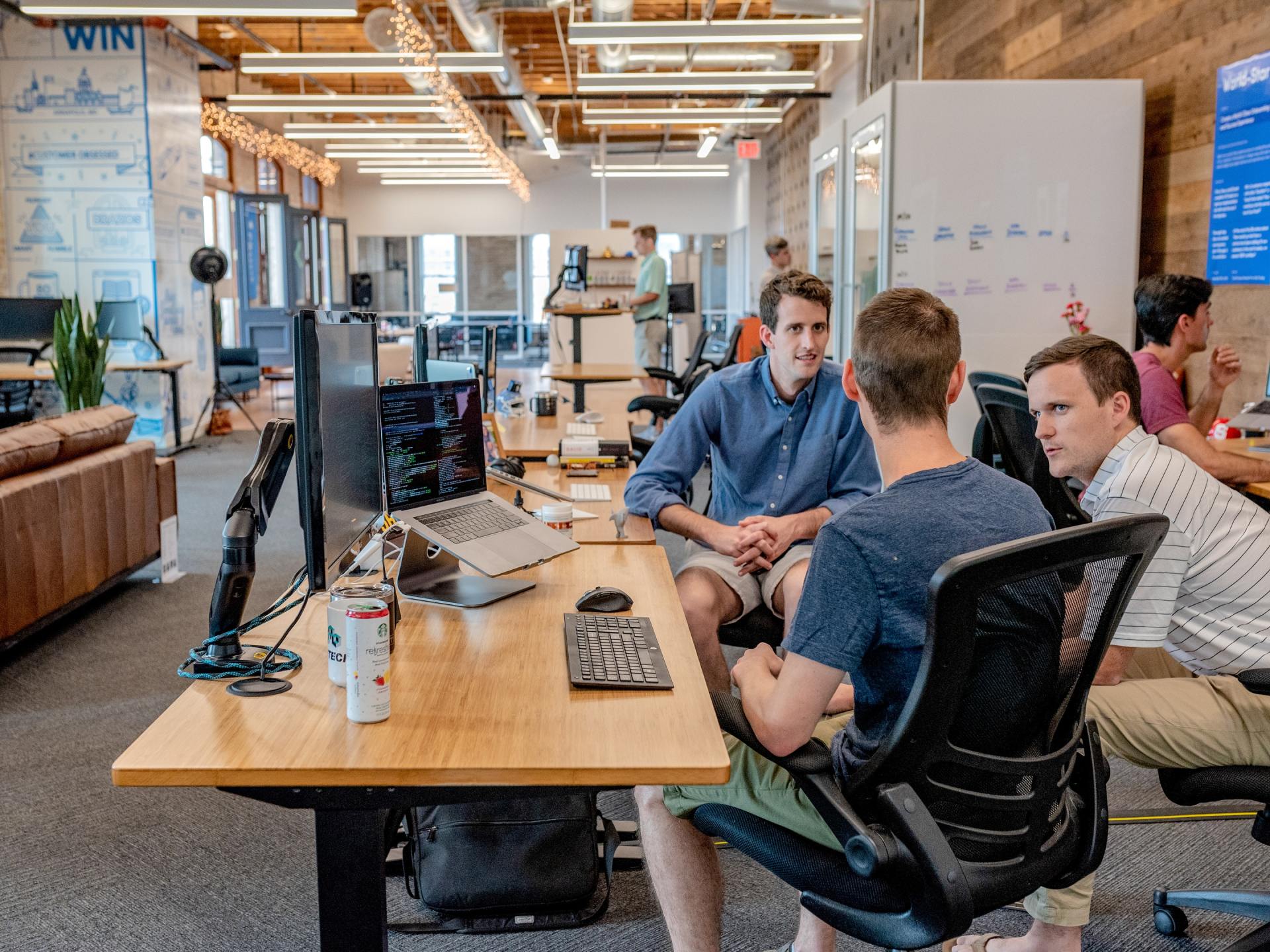The A Team
- By Mark Aikman
- •
- 09 Sep, 2020
- •
The people you really need for successful digital transformation

Successful digital transformation depends on selecting the right team. Duh, of course.
But who do you really need in your A-Team? Well, quite obviously, “people who know about technology”. Naturally, your key personnel will depend on the nature of your programme – but you don’t need me to explain that you’ll need an A1 AI guru if that’s your big opportunity; or a cunning security expert; or sparky developers. The technical roles are usually the easiest to identify; and of course the success of the project is heavily dependent on their skills.
However, I’d argue that there are three more cornerstones to success. I believe a trio of role-groups are critical within the programme and recruiting for these is often delayed, or hurried, or overlooked, as they are not – at first glance – the stars of the show. But in these three sets, the quality of the individual is pivotal to programme success. So my recommendations for careful recruitment in the three groups are:
Group 1: The holy trinity of Commercial, PMO and Finance
Three very big roles, here. I’m making a point by lumping these three together.
Historically in IT, these roles were traditionally seen as absolutely separate from each other. Indeed, I’ve experienced projects where there has been downright territorialism and Byzantine empire building, with each lead washing his/her hands of any connected responsibilities that can be passed onto the other guys. That type of approach is hopelessly old-fashioned and culturally chocolate-fireguard-ish. This trio need to work in harness.
I will always hire collaboratively-minded people for these three roles – folk who will work together to ensure everything is the team’s collective responsibility. This avoids mistakes as tasks fall between two bailiwicks: and even better, it avoids all those hours wasted on forensically identifying whose mistakes the mistakes were….
So what are the other skills and qualities you’re looking for here?
Commercial (aka Procurement)
The right relationship with suppliers – “partners” – is critical to the success of the programme. It therefore follows that the right person managing the supplier relationship is also pivotal.
My first point on the Commercial role is that this person gets hired early-doors. There is no sense in hiring Commercial to pick-over the Swiss cheesy contracts with suppliers that you put in place before the professional arrived on the scene. Hire Commercial before contracting with any supplier.
Next, make sure that the Commercial Manager truly understands partnership working. You need Commercial people to be those who understand that outcomes are agreed with suppliers – and never assumed. My rule of thumb with the client-vendor relationship is that you never have to take the contract out of the drawer. Nothing should arise which makes it necessary to even check The Rules of What We Should Be Getting. We’re seeking to create a situation where suppliers – shock! – are allowed to make a reasonable profit from the job and in exchange will always go the extra five miles. So you need a Commercial Manager who has written that into the deal and then – belt and braces – engendered the necessary supplier pride and loyalty to ensure it occurs.
Programme Leads might be tempted to perform this function themselves. If you have the right experience and commercial acumen, you’d probably be suited to it. However, it’s important not to underestimate the amount of work it takes to effectively manage supplier relationships – including the dainty detail of contracts, timing plans and SLAs. As Programme Lead, you will have many, many more demands on your time – so as a minimum, get someone in who’s good with the teensy-tiny detail and will own the supplier relationship day-to-day.
If I’ve made you doubt you have capacity/time available, you may prefer to bring in some support to get the very best from the supplier relationships. I’d recommend you look for an experienced Commercial Manager who:
- Works collaboratively with all parties
- In particular, works hand in glove with Finance and PMO, without silos
- Is happy to get close to the detail, day-to-day
- Knows what questions to ask during due diligence, to see through any flannel from prospective suppliers
- Understands contracting and negotiation, as well as positive supplier liaison
- Thinks ahead, to ensure the contract is as all-inclusive as possible, to avoid a big bill from later date add-ons and unforeseen premium services
- Takes the long view, looking at the lifetime cost of the Programme so that it continues to be affordable to the business in five years’ time. Licenses keep on costing money, people!
- Has a good sense of the commercial landscape, knowing what’s for sale and what it’s worth…
- ... but nonetheless has empathy for the supplier’s position and their need to come away from the experience feeling positive about your organisation
And yes, you’re right. I am indeed saying that the days of Procurement being The Office Rottweiler are over. The type of negotiator who insists on nailing the vendor to the table and then laughing in his face is consigned to Gene Hunt World, where they belong.
This is because a contract works best when all parties are happy with it. If either supplier or client feel they are being ripped off, defensiveness creeps in, and then ultimately conflict and frustration. All that takes time away from Getting The Job Done and Doing A Good Job. It’s wasted energy.
So you’re looking for an intelligent and knowledgeable expert, who sets the tone of the client-supplier relationship right from the stage of drafting the contract. He/she will then Chair “service review” meetings that help guide how the contract comes to life – which is quite an art. Some organisations will run supplier meetings monthly, but I prefer weekly, especially at the start, before there’s a chance for things to go adrift.
And there’s your first clue about the Holy Trinity. Quite obviously, those meetings will bring to light financial and project management issues. But these are not to be handed-down from on high to the other teams – they are to be solved by working across. We’re all on the same side. Even the suppliers….
PMO
You’re also going to need a PMO Lead who can keep both the organisation and the suppliers on-side. PMO is there to work alongside Commercial and keep the output going. In addition, they’re there to maintain the quality of what’s being delivered. It’s quite obvious they can’t do this without continuous reference to Commercial.
A good PMO lead recognises that the effectiveness of suppliers is client-dependent. If those of us inside the client organisation don’t keep our promises and meet our deadlines, we cannot then expect the suppliers to pick up the slack. So the talented PMO will also persuasively manage customer expectations and adherence to our obligations as the client.
In addition, PMO has to sidle over to the finance side of the pitch every now and again. It is extremely easy for the business, the Programme sponsors and, on occasion, even the transformation leads and Commercial to get a bit kids-in-a-sweetshop. The vendors come along flashing all the shiny new toys … and mission creep waits just around the corner… PMO needs to be the grown up and pull on the reins. Persuasive diplomacy is an excellent attribute to hire in the PMO.
Finance
Finance completes the jigsaw. In under-developed leadership teams, there is a tendency for PMO and Procurement to dump evaluation-before-payment with Finance. But it’s not appropriate for Finance to take time on evaluating output against contract in a vacuum. It takes close collaboration with the other two to decide when enough value has been achieved for payment to be made. You need a Finance Manager who keeps the dialogue open.
Group 2: Communications and training
The first rule of communications is… you DO talk about communications. Early doors. Communications and training are not something to bolt-on halfway through or towards the launch – you need the messaging managed from the very start.
There’s an old-fashioned school of thought that believes talking about the Programme before it’s visible and tangible brings it into disrepute; they think this is promising without delivering. In fact, that’s an assumption based on poor communication strategies. In reality, you need to talk about the programme all along – but say different things at the different stages. Therefore, you need Comms on the team – if only with a limited capacity – from the very beginning. It can be very helpful to involve the Comms team in the discovery phase, both to help shape the message and manage the (timeline of) expectations; and to have them be there to listen to how the business sees the problem and the Programme. They need that background information to communicate well.
So what are you looking for when hiring for these roles?
You need Communication people who are able to adapt to the reality of the situation. Of course, they need to be persuasive and technically skilled, but they need a very twitchy ear to pick up on the required tone. Therefore, you’re looking for:
- People who listen before they speak. The best Comms people sit quietly for a long time, drinking it all in, so that when they respond they pitch-perfectly hit top notes.
- People who can adapt the communication so that it rings-true with each audience. You need people who understand the same message needs to be spun a dozen ways to suit a dozen audiences. Lazy one-size-fits-all communicators need not apply.
- People who explain persuasively but honestly, rather than people who sell. Polishing up the situation to make it more attractive will always be found out. Skilled communicators are those who can make the harsh reality acceptable. Or at least, tolerable and credibly fixable.
And what about the training teams?
For many years, IT thought the best bet for training was to send in the Local IT Expert – the person who knew the most about the relevant piece of software or hardware. That way, any question that arose could be answered. Stands to reason.
Meanwhile, back in real life, trainees don’t actually ask difficult questions about the far end of a farthing functionality of the kit. They don’t want an expert: they want a mentor. They want someone to teach and support them as they go through the difficult task of re-inventing everything they know about doing their job. Trainees are often in a place where they see the new solution as “slower” and “more work” than their familiar processes and tools. They’ll feel frustrated, exasperated and even threatened. Time to be kind.
Consequently, you’re looking for people with empathy, a supportive attitude and saintly patience. Charm doesn’t go amiss, either. And again, it’s worth hiring a small training capability early, as prototypes and demos shared with focus groups and UAT volunteers can all be used as part of the engagement campaign.
Which brings me to the final point on this group. As with Commercial, PMO and Finance, try to view Training and Communications as a single entity. Communicators help educate the business; and trainers help the business understand the changes that are happening. The roles overlap and interlock. This team’s members may originate from PR and HR – but they need to work on the Programme as a joint enterprise.
Group 3: the Analysts
The analysts are last, but not least. Indeed, the analysts are arguably first, in that – can you believe this? – you need to do (most of) your discovery before you commit to buying anything. You need the analysts to gain insight into the business, its needs and its current position before you can start committing to suppliers. Time and again I see digital transformation programmes commit to suppliers, services or products BEFORE knowing what it is that’s really needed. Analyse first!
So in this final cluster, I’m including all the people who work with detail, data and information, from the Business Analysts who look at discovery; to the Testing Teams who check that it’s working. Traditionally and unkindly viewed as the Data Nerds, the analysts are coming out of the cupboard under the stairs in modern change programmes. We need them interacting with the business.
Discoverers are here to build the blueprint of facts before we begin. That might be on people or processes, or what shape your data is in. Sometimes, frankly, they even need to go off and discover where your data is!
Roles like this have an enormous impact on the success of the Programme – because it’s only ever as good as the investigation and checks that it’s based on. Therefore, this time you’re looking for people who:
- Can identify and interrogate detail. They need to be thorough in doing this…
- … but still able to deliver analysis in a timely manner. You cannot take any decisions until they’ve done their work, so skills for balancing content and pace are essential
- Discoverers need to be open-minded, to watch and listen without bringing pre-conceived ideas and solutions to a project. You need people who can interview and facilitate, without bias.
- They need imagination to view the situation from a number of standpoints and lenses, weigh the importance of each perspective and thereby create realistic options for consideration by decision-makers.
- All the analysts also need to be able to build relationships with the business. They are an integral part of the engagement process – from the BAs asking the process owners what functionality they need, to the UAT testers giving it a run out with prospective users. They need to be persuasively on-message and able to build good relationships, part of the team warming-up those people who believe All Change Is A Bad Thing.

https://www.future-processing.com/blog/selecting-a-supplier-natural-selection/








